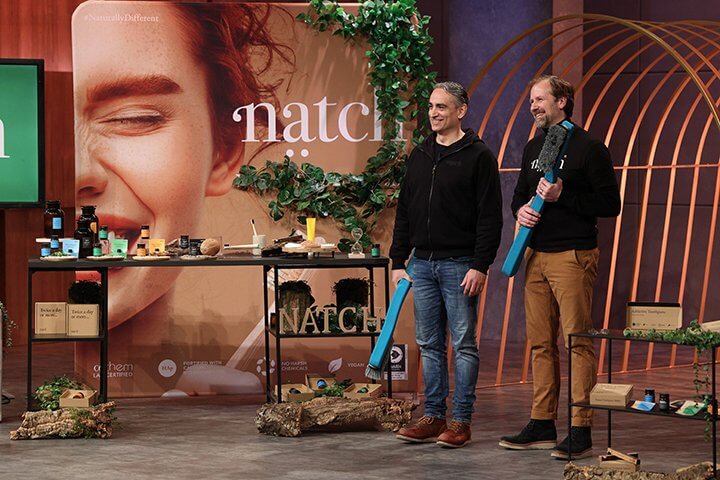natch: When can you base a rating on a forecast? #DHDL
In the third episode of the current season of "Die Höhle der Löwen" there was once again plenty of criticism of a rating. But the founders had actually come up with a derivation. Why was this not convincing?
Mittwoch,
13.09.2023

Brushing your teeth is something that most people don’t think too much about. So it comes as no surprise that not much has changed since toothpaste was first introduced to the market in 1907.
However, Norbert and Heber from the start-up natch are not the only ones who think that it’s about time they did, as around 20 billion tu
bes are thrown away every year, and many pastes are anything but high-quality.
They want to change that with their toothpaste tablets, which are simply chewed, contain only high-quality ingredients and come in a glass instead of a plastic tube. The lions try it out and are quite taken with it. But then, of course, they want to know why the founders are calling for a quite respectable company valuation of 375,000 euros for 10%, and they go to work on the figures.
Regardless of the valuation, however, the price already provokes strong reactions, because the lions consider it to be quite high at 11.90 to 14.90 euros per glass – depending on the variety. If you compare this with conventional toothpaste tubes, the indignation is understandable: there are 85 tablets in a natch jar, so you can brush your teeth 85 times with it. Assuming you brush twice a day, you would need almost 13 jars per year, which would cost between 150 and 200 euros. The average toothpaste tube, of which we Germans use about 5 per year, thus accounts for less than 10% of the costs.
Nils Glagau’s thesis that there can be practically no customers in this price range is therefore quite understandable. But the founders counter with a growing number of returning customers, even if we unfortunately don’t learn any details here.
Janna Ensthaler, who was pregnant at the time, then also emphasises the big issue of fluoride, especially among parents, for which natch probably has a solution: a different micro substance is used in the tablets, which also strengthens the tooth enamel, but is supposed to be less harmful. The investor and mother-to-be stresses that this would be a big deal, but ultimately drops out because the sales figures do not justify the high valuation for her.
Subsequently, it is precisely this ratio that is at issue, as the founders demand more than 27 times their current annual turnover with their valuation of 3.75 million. But their justification is well worth discussing, because they do not want to discuss the ratio to the current annual turnover at all, but rather use the annual turnover forecast for the current year as a basis, which is supposed to be over 800,000 euros. This would then „only“ correspond to a multiple of just under 4.8, which Ralf Dümmel still thinks is not low.
But can you do that at all, or does this approach immediately meet with rejection from investors?
As so often, the answer is: it depends. Because everything stands and falls with the comprehensibility of the forecast. The more certain investors are that it is realistic, the more willing they are to listen to the argument.
This means that, first of all, you need a financial plan that is well structured and, above all, comprehensible. To do this, you must by no means derive your turnover from any market volumes or perhaps even drop it from the sky altogether, as is the case in many templates that are floating around online. These may still be accepted by banks, but not by professional start-up investors.
The key here is so-called bottom-up planning, i.e. a precise linking of the marketing or sales budget with the corresponding measures and the customers that emerge from them. If you can back this up with current key figures such as customer acquisition costs from current business, you have a good chance of making the whole thing credible. Nevertheless, you always have to keep an eye on the whole ratio, because the greater the assumed growth – such as here an increase in turnover from 135,000 to over 800,000 euros – the more sceptical investors will be.
Founder Norbert seemed to have done his homework, however, and emphasised that they know exactly what they have to do in marketing to actually reach the targeted 800,000 euros.
Normally, such a claim should then prompt all kinds of detailed questions from investors. A suitable investor would then ask about marketing measures, their costs, the previous scaling attempts and all the details, which could well have happened here, but did not make it into the final cut.
Since in the end all investors turned down and all criticised the too high valuation, one could assume that the special key figures were not good enough for the lions to even enter the negotiations. However, since the founders had gone into the cave with a starting bid of 10% and thus the valuation could easily be halved with a counteroffer of 20%, it can be assumed that there were other reasons. The high price of the product was often mentioned, but here too the rather low production costs suggest that something might still be possible, especially with larger quantities.
Rather less discussed was one of the main USPs of the new micro-ingredient, which sounded very revolutionary. Perhaps the fact that something like this would normally have to be thoroughly tested, which is not at all possible in the cave, was the deciding factor for one or the other investor who was actually interested. Perhaps the 8 previous angel investors also gave one or the other lion the rest.
All in all, it was probably just too unfavourable a constellation for an investment with a few risk points.
But hopefully this won’t stop anyone from rethinking their toothbrushing routine.
Photo (above): TVNOW / Bernd-Michael Maurer

Ruth Cremer
Ruth Cremer ist Mathematikerin und Beraterin sowie Hochschuldozentin auf dem Gebiet der Geschäftsmodelle, Kennzahlen und Finanzplanung. Als ehemalige Investmentmanagerin weiß sie, worauf Investoren achten und hilft auch bei der Pitch- und Dokumentenerstellung im Investitions- oder Übernahmeprozess. Seit 2017 ist sie als externe Beraterin an der Auswahl und Vorbereitung der Kandidaten in "Die Höhle der Löwen" beteiligt.
